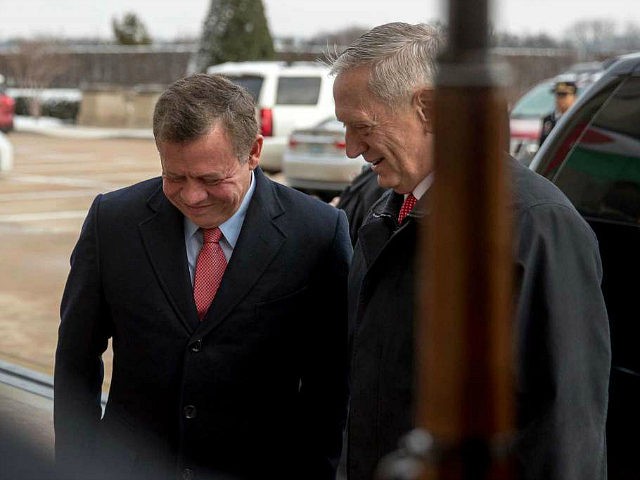Jordan’s King Abdullah is in Washington this week to meet with high-ranking members of the new administration, including a meeting with President Trump scheduled for Thursday.
Abdullah met with Homeland Security Secretary John Kelly and Vice President Mike Pence Monday. He is the first Arab leader to meet with the Trump administration.
The Jordanian king is reportedly encouraging Trump to take a tough line against terrorism, especially the Islamic State.
“The king will seek a stepped-up campaign against the extremists and secure extra resources to help ensure the militants would not be allowed to move towards our borders,” an anonymous official told Reuters on Monday.
“Abdullah, a former special operations commander, shares Trump’s views about the priority of fighting the hardline group, warning repeatedly of its threat to a kingdom that borders Israel to the west, Syria to the north and Iraq to its east,” Reuters notes.
Reuters cites two officials who said Abdullah was “heartened by a new Republican administration whose emphasis on traditional security would be a refreshing change from the former Obama administration’s concern over the pace of political reforms, which was seen in Jordan as interference.”
The strategic importance of Jordan is undeniable, but there are a few good reasons for the somewhat strained relationship between its monarchy and the Obama administration. The “pace of political reforms” alluded to by Reuters slowed considerably after the rise of ISIS turned Jordanian attention to threats from beyond its borders and insulated the country from international criticism to a large degree.
The political situation in Jordan is rather complicated, as The Washington Post explained in a March 2016 review. The “reform process” cannot be summarized as “get rid of the monarchy because it’s obsolete.” On the contrary, Jordan’s elected government usually comes in for tougher domestic criticism than the king. Some groups think the economy grew too liberalized under previous reforms and want the government to become more powerful. And, of course, there are Islamists like the Muslim Brotherhood waiting in the wings.
Another potentially delicate subject is Jordan’s relationship with Russia, including what is widely described as a close personal friendship between King Abdullah and Russian President Vladimir Putin. Radio Free Europe notes that Abdullah just visited Moscow last week, where he told reporters he and Putin share “the same vision of bringing stability to our region.”
“Without Russia, we will not be able to find solutions to not only the Syrian problem but other regional problems in the Middle East,” Abdullah declared.
ABC News saw fit to slip a little unfounded speculation about Jordan’s relationship with the Trump administration into its review of reactions to Trump’s executive order on immigration: “Pro-Western Jordan isn’t among the countries slapped with the travel ban, but views refugee resettlement to the U.S. and other countries as a way of easing its own burden; Jordan hosts more than 650,000 displaced Syrians.”
Even more egregiously, the Times of Israel devoted almost the entirety of its article about Abdullah’s visit to Trump’s executive order and responses from people who have nothing to do with Jordan. The article sets up a dramatic juxtaposition of the king’s visit with the weekend hysteria over Trump’s order in the headline — “Jordan King to Visit U.S., 3 Days After Trump’s Refugee Ban” — but then says absolutely nothing about Abdullah, his visit, or the reaction of anyone in Jordan to the executive order.
It is reasonable to speculate that the topic will be covered during Abdullah’s visit to Washington since, as NBC News points out, many Syrian refugees obtain their U.S. visas in Amman, the capital of Jordan. However, the only significant policy dispute between Jordan and the Trump administration to date has been a warning that moving the U.S. Embassy to Israel from Tel Aviv to Jerusalem would cross a “red line” for Jordan, with potentially “catastrophic” consequences.

COMMENTS
Please let us know if you're having issues with commenting.